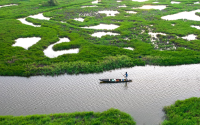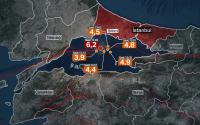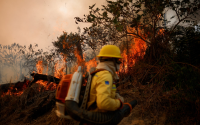12 October 2005Guardian
The scale of the disaster has traumatised the entire country - or perhaps not quite. Here in Lahore a group of people collecting funds for earthquake relief were apprehended and charged. They were amassing money for themselves. Even in the midst of devastation, life goes on. The global media have descended on the country, their reports repeating the same images and the same banal comments every few minutes. Soon they will move on, so that when they are really needed, to monitor relief efforts and reconstruction or keep watch on the funds, they will no longer be there. The citizens of the west will also forget. But Pakistan will never be able to.
The situation in the north-west of the country is much worse than has been reported. The prime minister, Shaukat Aziz, lost his cool at local journalists for reporting the destruction of schools and the deaths of hundreds of children: "Why are you being sensationalist? Be optimistic!" The defensiveness was unnecessary. Nobody blames the regime for the earthquake and even the normally loquacious Frontier province and Afghan mullahs, eager to describe Katrina as "God's punishment" for US wars, have fallen silent. Why would Allah punish the Islamist strongholds in Pakistan?
The death toll has been underestimated. Balakot, a small city which is the gateway to the beautiful Kaghan valley and heavily dependent on tourism, has been destroyed. Corpses litter the streets. According to yesterday's estimates, at least half of the city's population of 100,000 is now dead. A whole generation has been wiped out. Survivors were, till yesterday, without food or water because the roads were wrecked and helicopters were in short supply.
It is the same story in Muzaffarabad, in Pakistani-controlled Kashmir. Everything is wrecked. Here there have been anti-government protests and citizens have "looted" shops in search of food, just like in New Orleans. Further up on the Indo-Pak border, where a state of permanent tension is deliberately kept alive by both sides, 400 Pakistani soldiers sitting in trenches were crushed to death as the mountain wall protecting them crashed and buried them alive.
What of the relief effort? The government is doing its best, but it is not enough. The absence of a proper infrastructure, a dearth of reserve funds to deal with unexpected tragedies, and a total lack of preparedness despite annual disasters on a lesser scale, have cost innumerable lives. To watch General Musharraf on television bemoaning the shortage of helicopters was instructive. A few miles to the north of the disaster zone there is a large fleet of helicopters belonging to the western armies occupying parts of Afghanistan. Why could the US, German and British commanders not dispatch these to save lives? Is the war so fierce that they are needed every day? Three days after the earthquake, the US released eight helicopters from "war duty" to help transport food and water to isolated villages. Too little, too late.
Pakistan's army has been put into action, but armies are not suited to relief work. They are not trained to save lives, and reports yesterday that aid convoys are being attacked and seized by angry crowds long before they reach their destinations are an indication of the chaos.
Even in normal times the poor have limited access to doctors and nurses. The shortage of medical staff has been a curse for 50 years. No regime has succeeded in creating a proper social infrastructure. At times like this the entire country feels the need but it will soon be forgotten, till the next disaster. In a privatised world, the state is not encouraged to buck the system.
Things look bad here this week, but they will look worse when rescue teams arrive in areas still out of reach.






